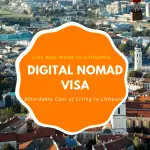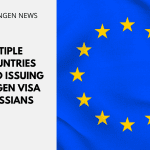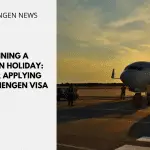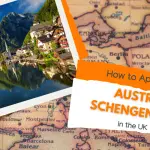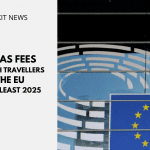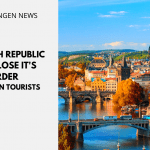How to Apply for a Lithuania Schengen Visa from the UK
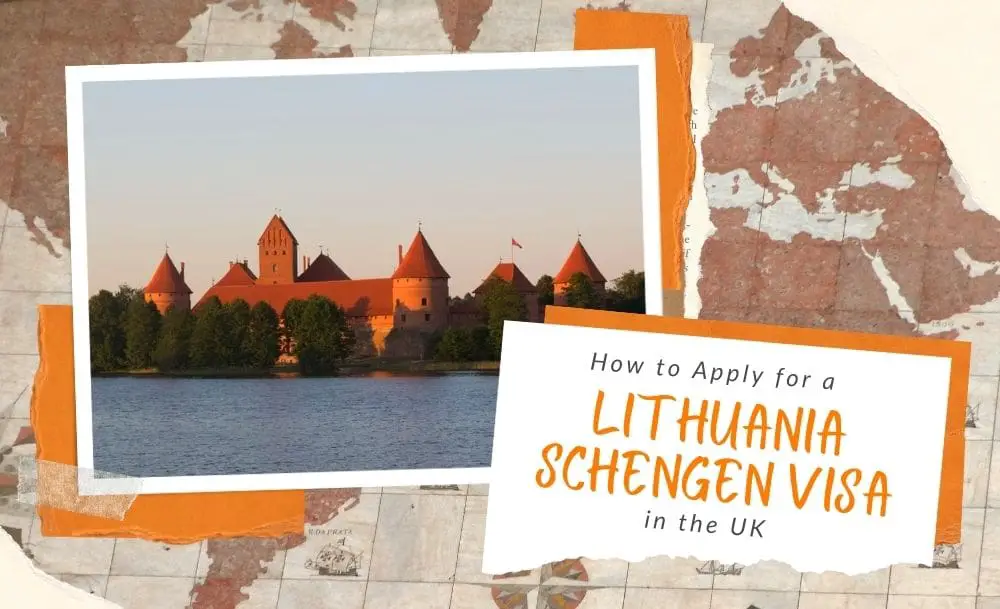 [su_spoiler title=”Contents In this Article” icon=”plus-circle”]
[su_spoiler title=”Contents In this Article” icon=”plus-circle”]
- Lithuania Entry Restrictions in Response to Coronavirus
- Who needs a visa to travel to Lithuania from the UK?
- Steps to Applying for a Lithuanian Schengen Visa from the UK
- Lithuania Schengen Visa Application Decision
- Lithuania Schengen Visa Extension
- Lithuania Schengen Visa Frequently Asked Questions
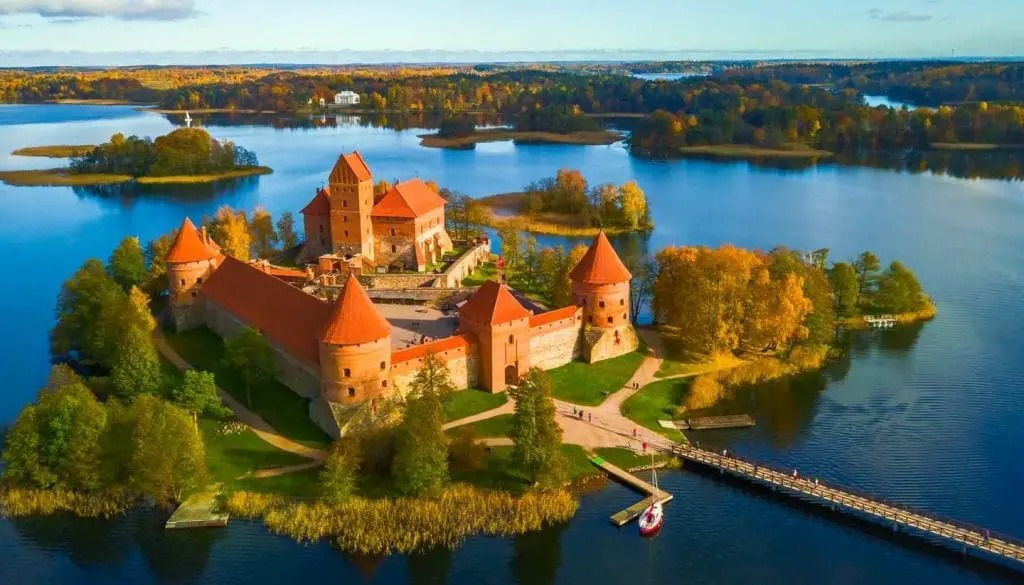
One of the Baltic States, Lithuania is a beautiful country with many incredible places to visit and countless things to do when visiting. Lithuania became the first country in the Soviet Republic to leave the USSR in 1990 and since then has been trying to re-establish itself on its own right ever since. There are many relics of the Soviet period such as bunkers and museums, but you will also find a whole lot more in this country including beautiful churches, monasteries, and palaces.
Lithuania’s tourism industry has really boomed since it gained independence from the USSR. The country is a haven for nature’s aficionados as it boasts spectacular seaside villages and adventurous national parks. Several spots in the country are UNESCO World Heritage Sites and wherever you choose to go you will find winding cobbled streets, charming local markets, and impressive red-brick architecture.
Lithuania Entry Restrictions in Response to Coronavirus
In early 2020, Lithuania joined the rest of its Schengen country neighbours in closing its borders due to the COVID-19 pandemic. The country has since partially reopened its borders, with conditions. The requirements below are accurate at the time of posting, but they may change at any time and you should check on the latest news regarding restrictions, quarantine or whether a test will be required either from reliable news sources, the Lithuanian government website, or the UK government website one to two weeks before your trip to be aware of the latest requirements for travelling to Lithuania.
All third countries (countries not in the EU) are classified as “grey” countries and must present one of the following in order to enter Lithuania:
- a certificate of vaccination– the accepted vaccines are: Janssen, Comirnaty (Pfizer/BioNTech), Moderna and Vaxzevria (AstraZeneca)
- a certificate of recovery from COVID-19, confirmed by a positive PCR test, valid for 180 days since the date of the positive test
- a pre-departure negative COVID-19 test– the accepted tests are either a PCR taken not more than 72 hours prior to arrival or an RAT (rapid antigen test) taken not more than 48 hours prior to arrival.
Unless travellers from third countries can provide proof of full vaccination or recent recovery from COVID-19, they will need to self-isolate for 10 days from the day of arrival in Lithuania, which may be shortened if a second PCR test performed at the earliest on day 7 of self-isolation returns negative.
Those travelling for work can leave their place of isolation to perform their work-related duties following a negative PCR test result taken after arriving in Lithuania.
The rules for children are as follows:
- Children under 16 years old do not need to present a PCR or RAT test before travelling to Lithuania
- Children under 12 years old from red or grey list countries do not need to self isolate after arrival
- Children from 12 to 15 years old from red and grey countries do not need to isolate requirement after presenting a negative result to a PCR or RAT test
- Children under 12 years old from yellow countries do not need to submit a second PCR test
All travellers arriving in Lithuania will have to fill in the form from Lithuania's National Public Health Centre within 48 hours before entering the country and present the confirmation received, along with the QR code, at the time of boarding their mode of transportation or at Lithuania border control.
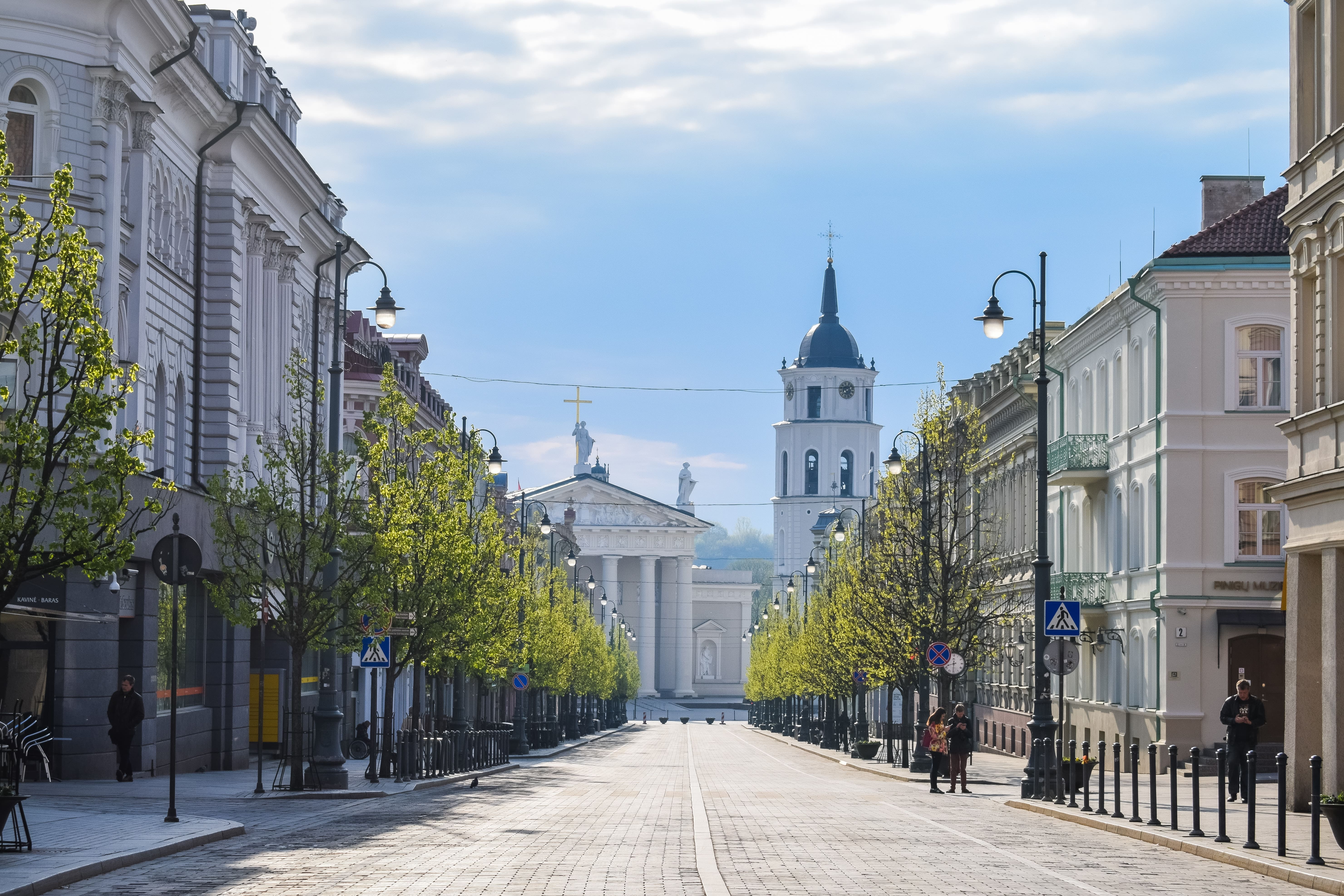
Who needs a visa to travel to Lithuania from the UK?
Travelling to Lithuania for EU/EEA Citizens
Lithuania is a Schengen country, which allows for free movement between the 26 EU and EFTA states (Iceland, Norway, Liechtenstein, and Switzerland). A uniform Schengen visa issued by one of the Schengen states is valid for travel within the whole Schengen area.
Travelling to Lithuania Post-Brexit for UK Citizens
The rules for travelling or working in Europe changed on 1 January 2021:
- You will be able to travel to countries in the Schengen area for up to 90 days in any 180-day period without a visa for purposes such as tourism. This is a rolling 180-day period.
- If you’re travelling to Lithuania, previous visits to the Schengen area within the 180 days before your date of travel would count against the 90-day limit. If you are travelling visa-free to Lithuania and to other countries in the Schengen area, make sure your whole visit is within the limit.
- To stay for longer, to work or study, or for business travel you will need to meet the entry requirements set out by Lithuania. This could mean applying for a visa or work permit. You should check with the Embassy of Lithuania what type of visa, if any, you will need.
- Periods of stay authorised under a visa or permit will not count against the 90-day limit.
At Lithuanian border control, you may need to queue in separate lanes from EU, EEA and Swiss citizens.
Check that your passport is stamped upon entering or exiting the Schengen area through Lithuania as a visitor. Border guards will use passport stamps to check that you are not overstaying the 90-day visa-free limit for short stays in the Schengen area. If entry or exit stamps are not in your passport, border guards will presume that you have overstayed and you may face penalties for doing so.
You can show evidence such as your boarding pass or tickets from when and where you entered or exited the Schengen Area, and ask the border guards to add this information in your passport.
At border control for Lithuania, you may need to:
- show a return or onward ticket
- show you have enough money for your stay
You should also check your passport is valid for travel to the Schengen Area before you book your trip, and renew your passport if you do not have enough time left on it. Your passport needs to be valid for at least 3 months after the day you plan to leave Lithuania, or any other Schengen country and less than 10 years old.
Travelling to Lithuania for Non-EU Nationals
Many non-EU nationals who reside in the UK are still required to get a Schengen visa to travel to Lithuania.
Citizens of the following countries residing in the UK and planning to visit Lithuania are required to get a Lithuania visa to be able to enter Lithuania.
[su_tabs][su_tab title=”A-C”][su_table]
| Afghanistan | Algeria | Angola |
| Armenia | Azerbaijan | Bahrain |
| Bangladesh | Belarus | Belize |
| Benin | Bhutan | Bolivia |
| Botswana | Burkina Faso | Burma/Myanmar |
| Burundi | Cambodia | Cameroon |
| Cape Verde | Central African Republic | Chad |
| China | Comoros | Congo |
| Cote D'iviore | Cuba |
| Dem. Rep. Of Congo | Djibouti | Dominican Republic |
| Ecuador | Egypt | Equatorial Guinea |
| Eritrea | Ethiopia | Fiji |
| Gabon | Gambia | Ghana |
| Guinea | Guinea-Bissau | Guyana |
| Haiti | India | Indonesia |
| Iran | Iraq |
| Jamaica | Jordan | Kazakhstan |
| Kenya | Kosova | Kuwait |
| Kyrgyzstan | Laos | Lebanon |
| Lesotho | Liberia | Libya |
| Madagascar | Malawi | Maldives |
| Mali | Mauritania | Mongolia |
| Morocco | Mozambique | Namibia |
| Nepal | Niger | Nigeria |
| North Korea | Northern Mariana's | Oman |
| Pakistan | Papua New Guinea | Philippines |
| Qatar | Russia | Rwanda |
| Sao Tome And Principe | Saudi Arabia | Senegal |
| Sierra Leone | Somalia | South Africa |
| Sri Lanka | Sudan | Suriname |
| Swaziland | Syria | Tajikistan |
| Tanzania | Thailand | Timor-Leste |
| Togo | Tonga | Tunisia |
| Turkey | Turkmenistan | Uganda |
| Uzbekistan |
| Vietnam | Yemen | Zambia |
| Zimbabwe |
The main requirement is that you must have a UK residence permit valid for at least another three more months beyond the date you plan to leave Lithuania/ the Schengen Area.
Before starting a visa application, or getting a flight to Lithuania, make sure to check whether you need a visa to Lithuania or not.
If you have a 3-month UK visa you can extend it for three more months in order to be eligible to apply for a Lithuania Schengen visa from within the UK. You must apply for an extension before your visa expires and while you’re still in the UK.
Note: You can stay in the UK until the decision about the extension is taken, but only if you have applied within the visa period.
You should apply for a Lithuania visa at the appropriate Lithuania Embassy/Consulate or Lithuania visa application centre in the UK if:
- Lithuania is the only Schengen country you plan on visiting
- Lithuania is your main destination (the country you will be staying the longest in)
- Lithuania is the first Schengen country you are visiting (when spending an equal amount of days in Lithuania and another Schengen country)
In case you plan on staying in Lithuania for more than 90 days you must apply for a residency permit, not a Lithuania Schengen visa.
Please, note that if you are not a resident in the United Kingdom you should apply at the Lithuania Embassy/Consulate/VAC in your home country of residence.
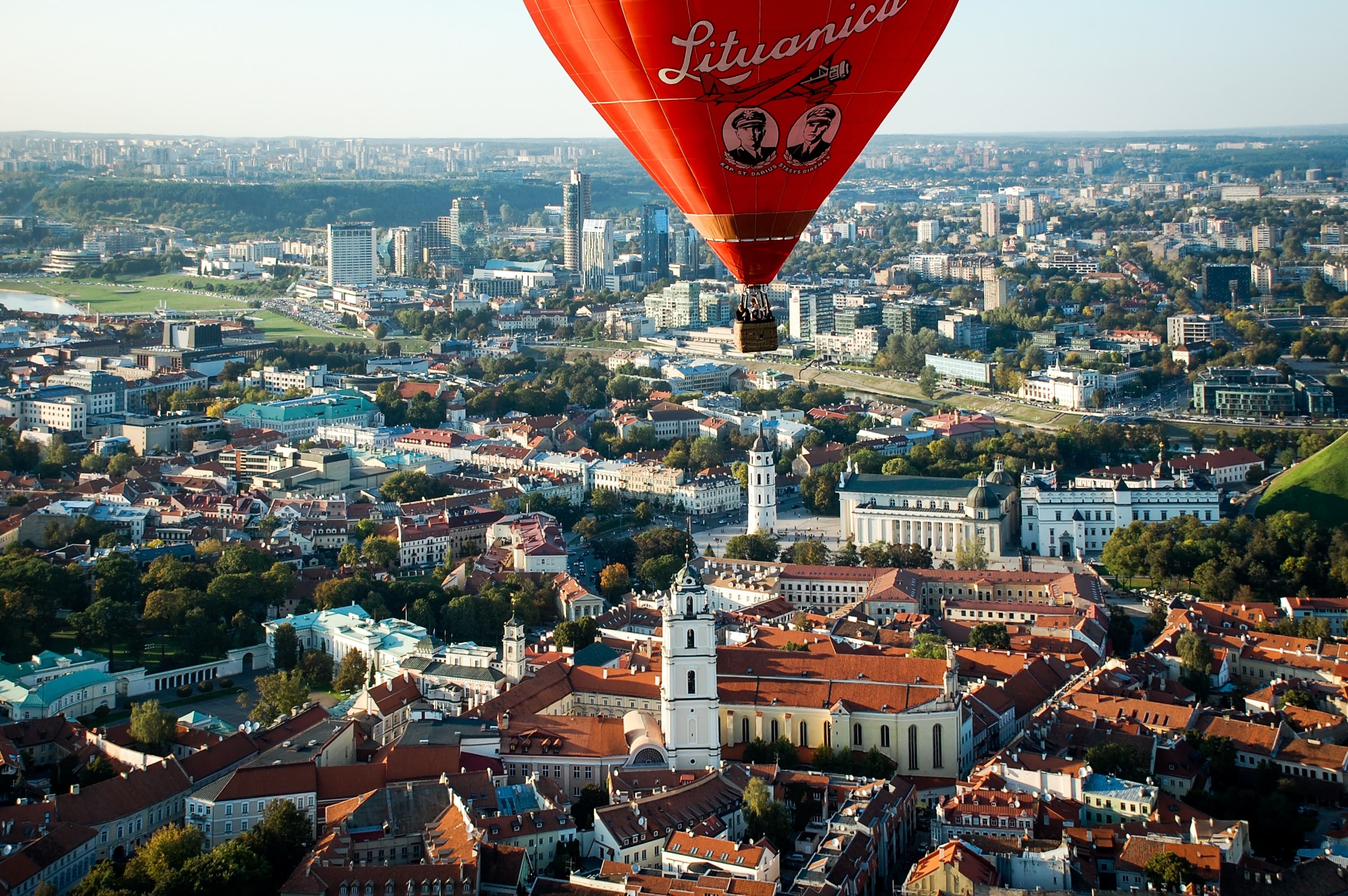
Steps to Applying for a Lithuanian Schengen Visa from the UK
Step 1: Know your visa type and validity
There are 2 types of Schengen visa that you can apply for. The one you need will depend on the duration of your trip and your reason for travelling to Lithuania:
- Short-stay (Schengen) Visa – valid for up to 90 days (in a 180-day period) for the purposes of tourism, business, visiting family/friends, conference, EEA/EU national family member
- Residence and work permits (Long stays) – you should apply for this kind of visa if you want to live in Lithuania for more than 90 days for employment, family reunification, study, research etc.
You will then be issued either a single entry, double-entry, or multiple-entry visa for up to 5 years based on the information you provide in your visa application.
Find out more about the types of Schengen visas in our article: Schengen Visa Types – All You Should Know When Applying for a Schengen Visa
Step 2: Identify where to make application and book an appointment
To apply for a Lithuania visa, you must book an appointment with the Lithuania Embassy in London,
You can do this through the following:
- Book it yourself through VFS Global
- Use a service like IaM who will also make sure that your application will have the best chance of being approved
Step 3: Complete your application form
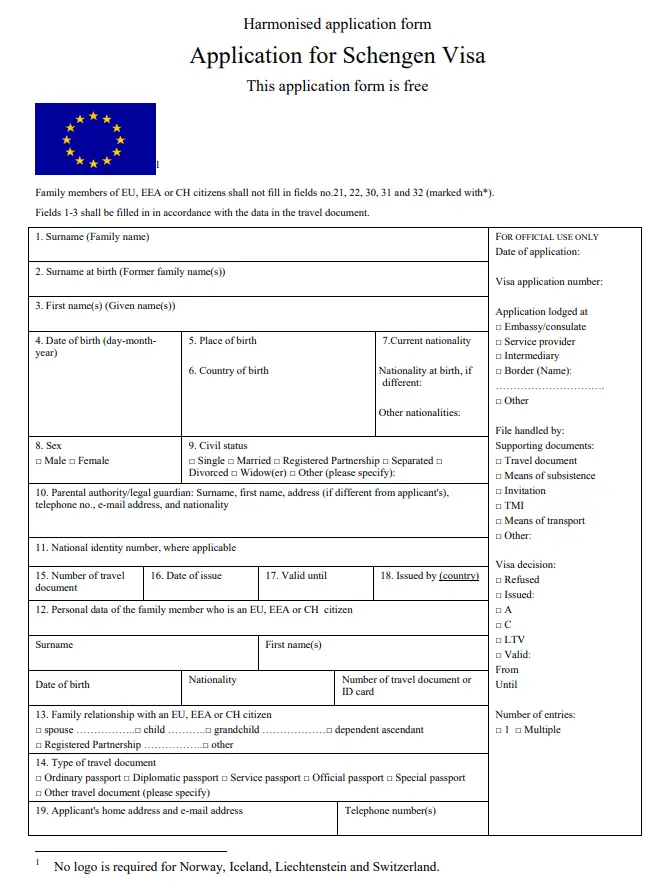
The Schengen visa application form contains questions about you including:
- Name and surname
- Date and place of birth
- Nationality
- Sex and marital status
- National Identity number
- Passport number
- Home address and email
- Purpose of trip
- Question regarding previous trips to Schengen, if any
- Intended date of arrival in Schengen area you are visiting, and the intended period of stay
- Cost of traveling and remaining in Schengen area you are visiting, who will cover them, etc.
Make sure your answers are correct and that they comply with the information in the rest of the documents. Complete the form, print it twice, and sign both copies at the end.
Find out more about how to complete a Schengen visa application form in this blog post.
Step 4: Prepare your documents
The following list of documents are required in order to obtain a visa to Lithuania in the UK:
- A valid passport or travel document. Please make sure:
- Your passport has been issued within the previous 10 years,
- Your passport has 2 full blank pages, one for the visa stamp and an additional spare page,
- Your passport will be valid for at least three (3) months after the date you exit the Schengen Area.
- A valid UK residence permit or other form of Identity Card.
- The UK residency permit must be endorsed in the actual passport (or on a new biometric ID card)
- The UK residence permit must be valid for at least another three more months beyond the date you plan to leave Lithuania.
- One Lithuania Schengen Visa application form filled out completely and signed by the applicant.
- One recently taken passport format photo with a blank background and where all your facial features are clear, which must be glued to the application form. Applications with stapled photographs will be rejected.
- A cover letter explaining the purpose of the visit to Lithuania
- Biometric data (if you haven’t provided biometric data within the last 59 months):
- Fingerprints
- A copy of the passport bio page where the photo is included.
Note: Children under the age of 12 are exempted from providing fingerprints.
- Proof of travel arrangements: Round trip flight/travel reservations or other proof of intended transport and complete itinerary of your visit to Lithuania (if several Schengen States will be visited or if the trip covers several Schengen States and non-Schengen countries).
- Travel insurance stating that you are covered in case of a medical emergency and repatriation not just in Lithuania but in the whole Schengen zone with a minimum coverage of € 30,000. Holders of diplomatic passports and family members of EU/EEA citizens are exempted from providing proof of travel medical insurance.
- Proof of accommodation in Lithuania:
- Evidence of a hotel booking or rental agreement, or
- Invitation from your Lithuania host (family member, friend) with a copy of their passport
- Proof of financial subsistence. You need to show to the Lithuania embassy in the UK that you have enough money to maintain yourself during your stay in Lithuania (According to the information provided by the European Commission, a foreign national who wants to enter the territory of Lithuania, while applying for a Lithuania Visa it needs to attest owning 48€/day for the period of stay in Lithuania). This could be a:
- Original recent Bank Statement (covering the last 3 calendar months. The last transaction must be no more than 1 month old)
- Traveller’s Cheques
Note: Cash is not considered proof of financial subsistence.
- Certificate of criminal record of the home country– showing that candidate has no open crime case involvement
- Proof of paid Lithuania visa fee.
Note: Photocopies of the original documents should also be submitted and documents should not be more than one month old.
The documents listed above are documents required in all cases, regardless of the purpose of your visit in Lithuania.
Additional documents required for your visa application based on employment status
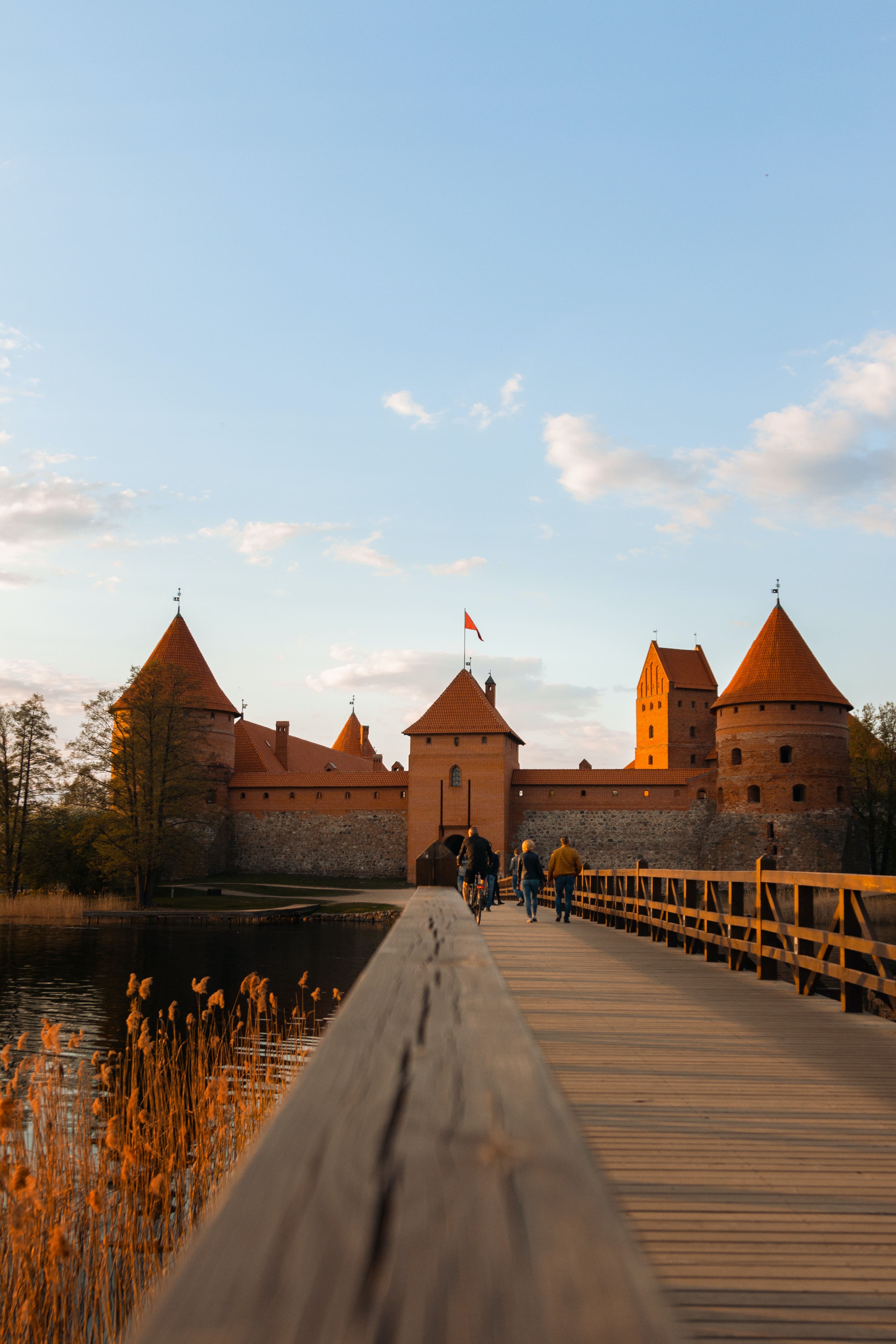
For employees:
- Employment contract
- Current bank statement of the latest 6 months
- Leave permission from the employer
- Income Tax Return (ITR) form or Certificate of Income Tax deducted at the source of salary
For the self-employed:
- A copy of your business license
- Company bank statement of the latest 6 months
- Income Tax Return (ITR)
For foreign students in the UK:
- Proof of enrollment
- No-objection certificate from school or university
For retirees:
- Pension statement of the latest 6 months
If unemployed and married to an EU citizen:
- A recent (less than 3 months old) Confirmation of Employment letter from their spouse’s employer stating the position held within the company as well as the starting date,
- Spouse’s valid passport
- An officially translated marriage certificate. The translation must be in English or Lithuania and must be certified as a true copy by the Embassy of the country where the marriage took place or by the Legalization Bureau of the Foreign Office in UK
Requirements for children under the age of 18:
Parents or an adult guardian are required to accompany their underage children to the application centre at the Embassy of Lithuania in London. Also, minors who are granted a Lithuania visa are not allowed to travel to Lithuania by themselves. They should be accompanied by an adult during their stay in Lithuania.
Apart from the general documentation required, accompanying should be other additional documents depending on the purpose of your Lithuania Visa application.
Additional documents required for the most frequent purposes of Lithuania visa application
Lithuania Tourist/Visitor Visa:
- Invitation letter from your family or friends in Lithuania with the address and phone number – if applicable
- Bank statement of the last 6 months
- Passport copies
Lithuania Visa for Business Purposes:
- Invitation letter from the Lithuania company you will be visiting and their detailed address accompanied with the dates of your visit
- A certificate from your employer stating/allowing your business travel
- If there were previous trade relations between the two companies, proof of such events must be provided
- Business bank statement of the latest 6 months
- Memorandum and Article of Association in original certified copy (registered with joint stock companies) Trade License (first issued and present renewal), Proprietorship/Partnership documents
- Regarding the applicant’s expenses during stay in the Schengen zone, either the employer or the partner company must state coverage of expenses on the letter or invitation.
Lithuania Visa for Medical Purposes:
- A local medical report
- A medical attestation from the hospital or doctor in Lithuania, confirming the date of your appointment as well as your medical situation
- Payment receipt of medical fees
Lithuania Visa for Cultural, Sports, Film Crew or Religious Purposes:
- Invitation letter from the above-mentioned authorities with details upon the nature of events or activities – purpose of visit, expense coverage
- Names of the applicants (crew members)
- Duration of stay
- Travel itinerary
Lithuania Visa for Members of Official Delegations:
- The official invitation copy
- Identity of applicant
- Purpose of journey (negotiations, meetings, event by intergovernmental organizations, consultations)
- Duration of stay
- Place of accommodation
Lithuania Visa for Study, Training, Research, or other types of Internship Purposes:
- An enrollment certificate allowing attendance of courses
- Certificate of completion or courses attended
- Financial sustenance
Lithuania Airport Transit Visa:
- Visa or other type of entry permit in the transit country
- Copy of your valid visa for your final destination
Required documents for visa application for underage children
- Birth certificate
- Lithuania Schengen Visa application form should be signed by both parents.
- Family court order, in cases where only one parent has full custody over the child.
- Certified copies of ID / passport of both parents
- A notarized parental authorization to travel to Lithuania, signed by both parents / guardians, if the minor will be travelling alone with another person.
All documents provided should be legalized.
Step 5: Attend your appointment
The visa interview is a meeting between you and the consular officer/interviewer. During this interview, the consular officer will ask you several questions about you and your intended trip. You will also be submitting the required documents throughout the meeting, to the interviewer.
Find out more about how to ace your Schengen visa interview in our article: Schengen Visa Interview Questions and Answers and How to Prepare for it

Lithuania Schengen Visa Fees for UK Residents
Since Lithuania is a Schengen country, the visa fees are the same as any other Schengen visa.
The fee must be paid upon submitting the Lithuania visa application. After you complete this payment, you will receive a receipt, which shows that payment has been made, which must be offered amongst other documents of the application dossier. You will have to pay a Lithuanian visa fee in order for your application to be processed.
Find out about the Schengen visa fee in our blog post: Schengen Visa Fees – How Much Does a Schengen Visa Cost?
Step 6: Receive your visa
Lithuania Schengen Visa Application Processing Time in UK
You can apply for a Lithuania Schengen Visa 6 months before your planned trip. Depending on the nationality of the applicant, the processing time may take at least 15 days from the day of application. In some cases when required documents are missing from the application, this process may take longer.
Therefore, to avoid unwanted complications, the Lithuania Consulate General in London advises that you provide all required documents and submit your application at least 20 workdays (4 weeks) before the day you leave for Lithuania.
Lithuania Schengen Visa Application Decision
- Approved – Once your visa is approved, it will be stamped in your passport. Make sure to carefully check the visa sticker to make sure everything is correct and exactly how you need it.
- Rejected – if your visa has been rejected, it would have been for a specific reason and you have the right to appeal.
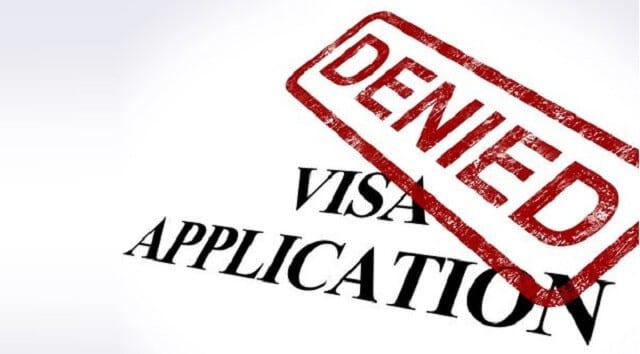
Common Lithuania Schengen visa rejection reasons
- Marriage certificate missing – if you are applying for a visa for family reasons, you may have to prove family ties. This is why you must provide a marriage certificate
- You applied for the wrong visa – it is your responsibility to apply for the correct visa depending on how long you are going to Lithuania for and your reason for travelling there
- It is not clear that you plan to return to the UK – it must be clear that you intend to return to the UK before the visa expires. If the visa staff have doubts about this, your visa will be rejected
- The purpose of your trip cannot be established – the reason why you are planning to go to Lithuania must be made clear. You can do this by providing specific documents like a full itinerary, work contract or invitation letter, etc.
What if my Lithuania Schengen visa is rejected?
If you receive a negative answer in your Lithuania Schengen visa application, this does not mean you cannot ever travel to Lithuania. You have two options.
- File an appeal for Lithuania Schengen visa rejection if you believe that the decision to deny you a visa is unjust. You should have a strong basis for your complaint. You can appeal this decision by writing an appeal letter for a Lithuania Schengen visa rejection.
- Reapply by correcting the mistakes you did in your previous application. Or improve your situation to comply with the eligibility criteria for a Lithuania Schengen Visa.
Lithuania Schengen Visa Extension
A person visiting Lithuania on a Schengen visa is allowed by law to extend their visa if they have legitimate reasons. This could be either personal, professional, medical, emergency, or any other. The decisions to approve a Schengen visa extension request are handled case by case.
The duration you are allowed to stay in the country is stated in your Schengen visa sticker. It is important not to overstay during your trip to Lithuania or the rest of the Schengen Zone or risk facing penalties like a fine, deportation, being banned from travelling back to the Schengen Zone, and having difficulties in your future Schengen applications. There are also cases when people do not get any penalties for overstaying, for example a child or a person that cannot travel without a caretaker because of an illness or disability or an unforeseen event that prevents you from leaving the country, like COVID-19.
Find out more about overstaying in the Schengen visa in our blog post.
Schengen Visa Extension Application Process
If you wish to extend your visa and stay longer in the Schengen Zone, then you need to start getting ready for your application. The overall process of extending your Lithuania Schengen visa will involve:
- Determining whether you have a justified reason to request for an extension
- Submitting all the necessary documents. These include a valid passport that has the Schengen Visa used to get in the Schengen area stamped in it, one passport-sized photo, proof of financial subsistence, Schengen Visa Insurance that covers the extension duration, and all the documents that justify your reason for an extension
- Paying visa fees where applicable
- Attending a visa interview if necessary
- Waiting for the approval

Lithuania Schengen Visa Frequently Asked Questions
Is a Lithuania Schengen visa easy to get?
Yes, it’s easy to apply for a Lithuania Schengen visa! You can apply for the visa online or use immigration services like IAM to make the process even simpler for you and have a higher chance of your application being accepted.
How long does a Lithuania Schengen visa take to process?
You can apply for a Lithuanian Schengen visa up to 180 days before your planned trip. The Lithuanian visa application process takes a minimum of 5 working days but can take up to 2 weeks. We advise you to make your application 3 weeks before your trip to make up for any possible delays in processing.
How can I get a multiple entry visa to Lithuania?
If you want to get a multiple entry visa to Lithuania or any country in the Schengen area, you need to justify through your documents and your visa interview why you should be granted such a visa, which includes proving that you have sufficient resources to support your multiple trips.
How much is a Schengen visa for Lithuania?
The fee for a Lithuanian Schengen visa is 80€ for adults, 40€ for children between 6-12 years of age, and free for children younger than 6 years of age. Keep in mind that these fees may change depending on currency fluctuations and can be paid only in UK Pounds. Payments can be made in cash and by credit or debit card.
How can I get a Lithuania Schengen visa fast?
You can get a premium Schengen visa to get your Lithuanian Schengen visa within 24 to 48 hours, which includes personalised advice from an expert immigration adviser.
How much money do I need to show in my bank account for a Lithuania Schengen visa?
You will need 48€/day for the period of your stay in Lithuania.
Are Euros used in Lithuania?
Yes, the country adopted the euro as their currency when they joined the Schengen Area on 1 January 2015.
What other countries can I travel to on a Lithuania Schengen visa?
You can travel to any of the 26 countries in the Schengen Area and 18 other countries.
Are you ready to apply for your Lithuania Schengen visa? Let us know in the comments below!
IaM can help with your visa application to the United States, the UK & other countries
If you need help with a US visa, a UK Visa, or visa to Europe, including help with appointment booking obligations, IaM can help. For more information and advice on US immigration, UK immigration law and US visa applications or if you need any help or assistance please, reach out to your Visa Coordinator at IaM.
- How to Apply for a Luxembourg Schengen Visa from the UK - 14 March 2025
- How to Apply for a Liechtenstein Schengen Visa from the UK - 13 March 2025
- Austria Schengen Visa Requirements for UK Residents - 11 March 2025

